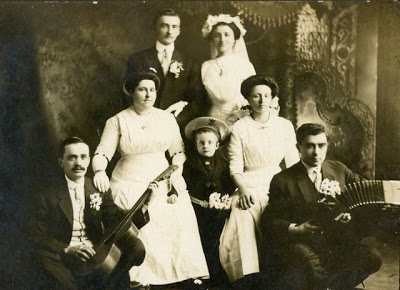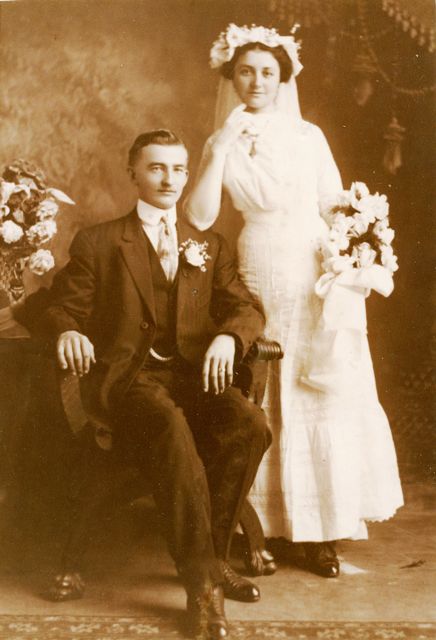Downright Immoral! Unseemly! Wrong! In 1911 that would have been the reaction if Elisabetha Ebner lived by herself upon arriving in Chicago (only “bad” girls did that), and moving in with her future husband, Josef, in Chicago was out of the question!
But she hadn’t come 5,000 miles to second guess her decision to marry Josef. No. They were married within two days of her arrival in Chicago. But how did it come about?
I found out in a “letter” she wrote to Lisbeth Plattner, née Jickeli, the little girl she had cared for back in Transylvania.The letter was dated September 25, 1972, sixty-one years and a day after Lisi had stepped off her ship, the Kaiser Wilhelm II, in New York.
That little girl was by now a 70-year old woman, with grandchildren of her own, and she and Lisi were still corresponding!
But why did I have a letter that should have already been mailed?
Lisi labeled this “letter.” “An der Rolle.” On the roll? What could that mean? Lisi thanked Lisbeth for an audio tape she had sent to Lisi and her family. “Thank you so much for the ‘Rolle’ with your voice.” Aha—now I knew. Lisbeth had sent Lisi a tape so now my grandmother was going to send one in return, but first she had written out a script for herself to be sure to say exactly what she wanted. Hence “on the roll,” the roll of audio-tape.
Lisi’s “script” was a brief summary of her life from her arrival in Chicago in 1911 to the time of the letter in 1972. It’s a fascinating insight into the mindset of two immigrants determined to do whatever was necessary to make it in their new land. This is what Lisi wrote about her initial arrival in Chicago (translated into English):

Josef and Lisi’s wedding day. I believe that’s Mrs. Beer, who wrote to Lisi about what a wonderful “catch” Josef was, on 1/29/1911 and husband, left. Perhaps George Fleischer, the witness, right, but not sure.
When I first came to Chicago, my husband had a two-room apartment and a Neppendorf [my grandfather’s hometown in Transylvania] man paid him to sleep there. [Josef] made only 7 dollars a week and worked every day from 5:00 in the morning until 7:00 in the evening and also received meals.
On October 11, I arrived in Chicago and rented a bed with a woman neighbor until October 13th, a Friday. In the morning my husband went to work as always at 5:00 am until 3 in the afternoon. Then he came home with the Neppendorf man and we three went to the judge. There was a pastor who blessed us in marriage. George Fleischer [perhaps the Neppendorf man] was witness. On October 14-15, my husband went to work from 5:00 a.m. to 7:00 pm as usual. Then on October 16th I began a job as a cook in a restaurant from 6:00 a.m. to 6:00 pm for six dollars per week, meals included. We always had work—even when those born in America didn’t.
Sound familiar? The hardworking immigrant willing to do whatever was necessary to get and keep a job, not so different from what we see today. It wasn’t long before Josef was able to double his salary. A photo of him at his job, coming up.

So he was a Swabian as described here?
http://en.wikipedia.org/wiki/Transylvanian_Germans
I continue to have letter envy. You are so lucky to have these glimpses into your ancestor’s lives! Fascinating. Thanks for sharing.
I join Jasia in TOTAL letter envy! That she saved it and just did not toss her rolling letter into the trash when she was done recording it, a marvel!
My in-laws’ honeymoon was even shorter. My father-in-law told my mother-in-law to get dressed up for a night on the town, then took the wedding gift money (enough in 1935 for the down payment on a house)and gambled it away, necessitating a quick escape from the hotel. Incredibly, they stayed married for 35 years until his death. I would have killed him the first night.
Thanks for reading. everyone! Jasia and Carol — I’m ever amazed not only at what was saved, but the labeling of everything. I can also tell this is a script because she abbreviated lots of words and names that in an actual letter would have been spelled out.
Interesting letter:) I really like the pics actually, reminds me of some turn of the century photos I have of some of my immigrant ancestors:)
Randy my grandparents did not consider themselves “Schwabian.” My grandfather’s German ancestors emigrated from Gerstheim on the “lower Rhine” in Alsace in 1770 to Transylvania (Siebenbürgen to the Germans), so considered “Saxon” Transylvanians. My grandmother’s side (Ebner) were probably descended from “Landlers,” those Lutherans who emigrated from Austria to escape persecution by the Catholics. I’ll be posting my discoveries about my grandfather’s ancestors in the near future.
Adrienne — sounds like your mother-in-law was a gambler too — but stuck with her “winnings,” even as he lost their savings. I remember Syd saying that he heard his parents always laughing in bed at night. Laughter may be what kept them together.
Mark, I’d love to see those photos. Josef & Lisi got pretty dolled up considering they had just a few hours to celebrate.
Mark,
I love these old photos — and have many. It’s so cool to see our grandparents so young and good-looking. I’ll bet yours are a treasure too.
Lisi certainly had determination and a gift for organization and self-expression.
Linda,
I’m glad I saw this post in the Genealogy Daily. I haven’t been very good with my google reader the last couple of days. I’m leaving for a couple of weeks in Europe tomorrow — lucky me. I can’t wait to read the next posts.
Kathy
This comment has been removed by the author.
Absolutely love reading the letters your grandparents and parents have written. They take us to another time and another place, especially when Lisi steps off of the Kaiser Wilhelm II in New York City; and, of course, when Josef writes of his ship, the Friedrich der Grosse and not knowing if he and his fellow passengers would ever see those waving goodbye from shore ever again. Their words touch my heart and soul.
I love your blog, Linda! I, too, have letter envy!!
Judy
Genealogy Traces /
Tennessee Memories